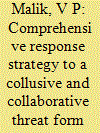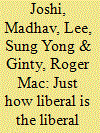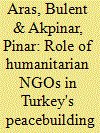| Srl | Item |
| 1 |
ID:
137766


|
|
|
| 2 |
ID:
133940


|
|
|
|
|
| Publication |
2014.
|
| Summary/Abstract |
This article assesses the extent to which the liberal peace (the dominant form of internationally supported peacemaking) actually deserves the sobriquet 'liberal peace'. In recent years, an intense debate emerged on this question as critics of the critique of the liberal peace have sought to downplay the dominance of the liberal peace. These debates are interesting but they are mainly based on qualitative analysis supplemented with some case study material, and often rely on assertions rather than evidence. This article seeks to add to this debate with simple aggregate data from the Peace Accords Matrix that is comprehensive and comparative. The article constructs a five-part framework to analyse the liberal elements of peace accords liberalism and then tracks the extent to which the elements of the framework are found in peace accords. Through this examination, it is found that the liberal peace is indeed the dominant form of peace-support intervention, although there are considerable variations in the extent and implementation of the liberalism in peacebuilding.
|
|
|
|
|
|
|
|
|
|
|
|
|
|
|
|
| 3 |
ID:
133939


|
|
|
|
|
| Publication |
2014.
|
| Summary/Abstract |
In March 2008 the United Nations General assembly adopted Resolution 62/214, which promulgated the 'Comprehensive Strategy on Assistance and Support to Victims of Sexual Exploitation and Abuse by United Nations Staff and Related Personnel'. Although reports on widespread sexual exploitation and sexual abuse emerged in the early 1990s, until 2008 there was no strategy specifically developed to assist women sexually exploited or abused by, and children fathered by, UN peacekeepers. In this sense, the Comprehensive Strategy is groundbreaking. However, we argue that UN policy fails to distinguish adequately between sexually exploitative and consensual relationships, which can create confusion for personnel as to what sexual conduct is permitted and what is prohibited. This paper will provide a critical analysis of the Comprehensive Strategy, examining its potential and obstacles to its implementation, with specific regard to children born to peacekeeping personnel engaged in consensual relationships with local women. This examination will be conducted within the context of the case study of Marko Šušnja, born to a Bosnian peacekeeper father and East Timorese mother.
|
|
|
|
|
|
|
|
|
|
|
|
|
|
|
|
| 4 |
ID:
139197


|
|
|
|
|
| Summary/Abstract |
This article illuminates the role of international HNGOs in Turkey's peacebuilding. Turkish HNGOs pursue low-level peacebuilding, focusing on interaction with grassroots, as opposed to the high-level peacebuilding of the state based on official interaction. Despite being independent, at times they become subsumed by the discourse, priorities and policies of the government and develop an interest in shaping official policies which carry the risk of politicizing the aid. While some of their key features such as flexibility, absence of conditionality, ensuring sustainability, relying on private donations and pursuing advocacy follow the mainstream peacebuilding lines, others such as culture and religion as catalysts and representing and promoting Turkey abroad demonstrate a deviation. Although the institutional consolidation of these HNGOs as a sector remains a distant goal, they are not likely to disappear given the considerable societal and political will behind their work. Their success depends on building a comprehensive strategy with efficient coordination and cooperation in a pluralist environment.
|
|
|
|
|
|
|
|
|
|
|
|
|
|
|
|